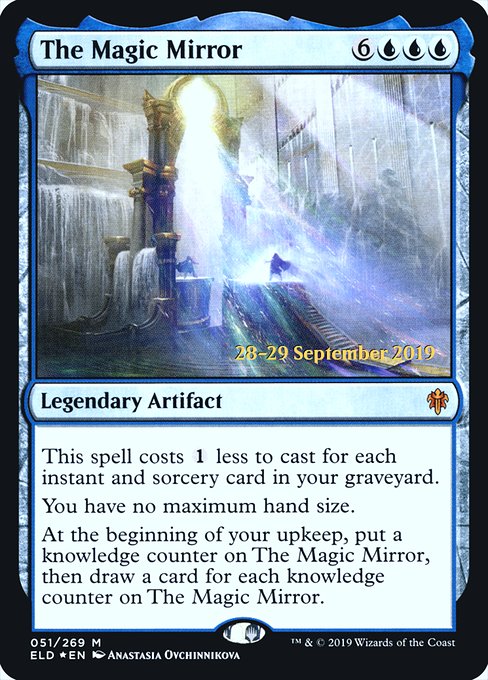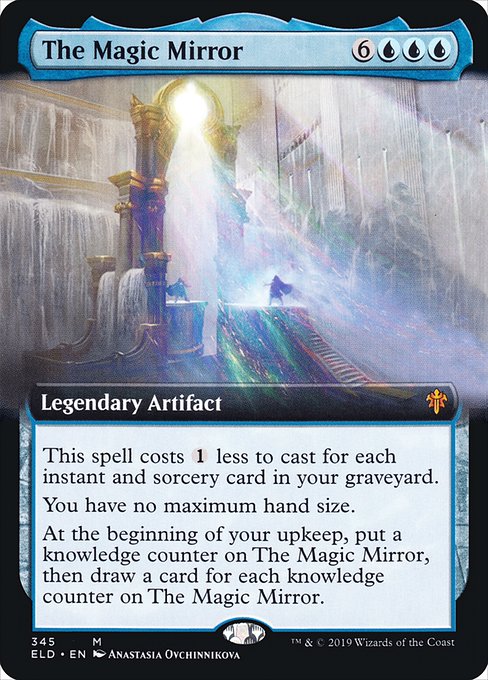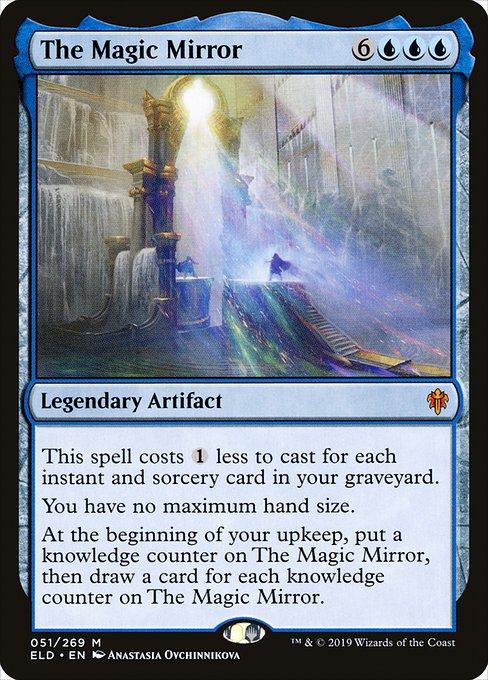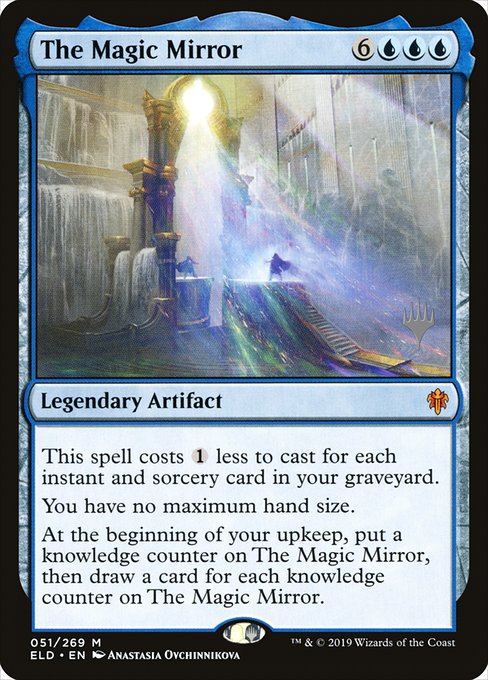standard
future
historic
gladiator
pioneer
explorer
modern
legacy
pauper
vintage
penny
commander
brawl
alchemy
paupercommander
duel
oldschool
premodern
Rulings
If a split card is both an instant card and a sorcery card, it's only counted once for The Magic Mirror's cost reduction ability.
Once you announce that you're casting a spell, no player may take actions until the spell has been paid for. Notably, opponents can't try to change by how much a relic's cost is reduced.
The cost reduction ability reduces only the generic mana in the relic's cost. The colored mana must still be paid.
If The Magic Mirror leaves the battlefield while its last ability is on the stack, the ability will use the number of knowledge counters The Magic Mirror had before leaving the battlefield to determine how many cards you'll draw.
Adventurer cards aren't instant or sorcery cards while they're in your graveyard.
To determine the total cost of a spell, start with the mana cost or alternative cost you're paying, add any cost increases, then apply any cost reductions. The mana value of the spell remains unchanged, no matter what the total cost to cast it was.
Once you announce that you're casting a spell, no player may take actions until the spell has been paid for. Notably, opponents can't try to change by how much a relic's cost is reduced.
The cost reduction ability reduces only the generic mana in the relic's cost. The colored mana must still be paid.
If The Magic Mirror leaves the battlefield while its last ability is on the stack, the ability will use the number of knowledge counters The Magic Mirror had before leaving the battlefield to determine how many cards you'll draw.
Adventurer cards aren't instant or sorcery cards while they're in your graveyard.
To determine the total cost of a spell, start with the mana cost or alternative cost you're paying, add any cost increases, then apply any cost reductions. The mana value of the spell remains unchanged, no matter what the total cost to cast it was.
Rulings
If a split card is both an instant card and a sorcery card, it's only counted once for The Magic Mirror's cost reduction ability.
Once you announce that you're casting a spell, no player may take actions until the spell has been paid for. Notably, opponents can't try to change by how much a relic's cost is reduced.
The cost reduction ability reduces only the generic mana in the relic's cost. The colored mana must still be paid.
If The Magic Mirror leaves the battlefield while its last ability is on the stack, the ability will use the number of knowledge counters The Magic Mirror had before leaving the battlefield to determine how many cards you'll draw.
Adventurer cards aren't instant or sorcery cards while they're in your graveyard.
To determine the total cost of a spell, start with the mana cost or alternative cost you're paying, add any cost increases, then apply any cost reductions. The mana value of the spell remains unchanged, no matter what the total cost to cast it was.
Once you announce that you're casting a spell, no player may take actions until the spell has been paid for. Notably, opponents can't try to change by how much a relic's cost is reduced.
The cost reduction ability reduces only the generic mana in the relic's cost. The colored mana must still be paid.
If The Magic Mirror leaves the battlefield while its last ability is on the stack, the ability will use the number of knowledge counters The Magic Mirror had before leaving the battlefield to determine how many cards you'll draw.
Adventurer cards aren't instant or sorcery cards while they're in your graveyard.
To determine the total cost of a spell, start with the mana cost or alternative cost you're paying, add any cost increases, then apply any cost reductions. The mana value of the spell remains unchanged, no matter what the total cost to cast it was.
Your collection? Your decks?
Want to manage your collection and/or create decks?



 0
0
 4.92€
4.92€

